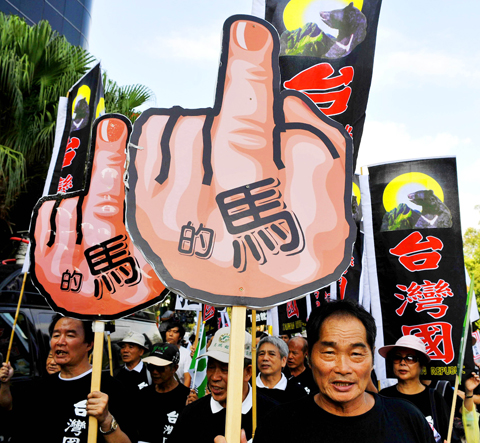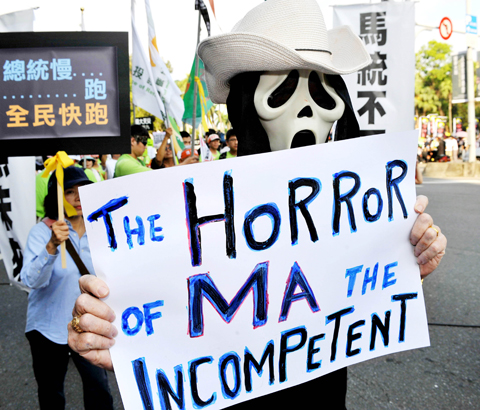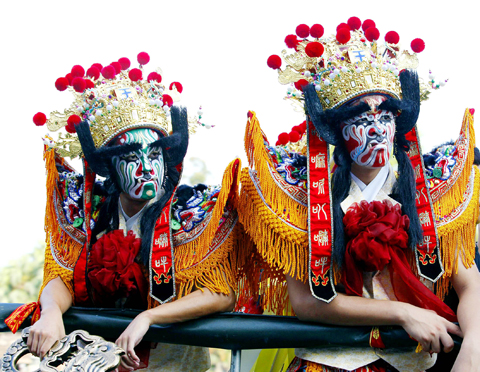Around 1,000 people joined a “pajama parade” yesterday — though only a handful of people actually wore pajamas — organized by artists unhappy with President Ma Ying-jeou’s (馬英九) leadership, calling on him to step down or to stop getting paid.
Following banners that read “stop paying the incompetent” and a woman dressed up as a Chinese zombie to portray Ma’s administration as a “zombie government,” demonstrators departed from the assembly point in front of the National Taiwan University and headed toward Ketagalan Boulevard in front of the Presidential Office, before moving on to Liberty Square for a rally in the evening.
Many brought along homemade placards voicing their discontent at the government, with slogans such as “Ma is the biggest disaster” and “the president is jogging, it’s time to start running,” alluding to Ma’s signature sport. Even with a busy schedule as president, Ma still manages to find time to take part in many running events.

PHOTO: SAM YEH, AFP
“We wanted to make this a ‘pajama parade’ because our government is always asleep, and with such an incapable government, the people may need to be prepared to escape from disaster in their pajamas at anytime,” said Koma Chen (陳佳汝), one of the event’s organizers and a theater artist.
As most of the organizers are artists, they decided to make the parade a little different from most other political demonstrations.
“We hope to turn the demonstration itself into action art, as well as a festival,” she said.

PHOTO: SAM YEH, AFP
Besides the organizers, however, only a few people actually wore their pajamas to the march.
Among the demonstrators were bajiajiang (八家將) performers. Traditional belief has it that the bajiajiang are eight generals who remove all evil spirits from a road before deities are to travel along them.
In most Taoist parades of deities on religious holidays, there are usually people dressed as bajiajiang marching and performing ahead of the deity statues.

PHOTO: NICKY LOH, REUTERS
The presence of the bajiajiang in the parade was thus to clear away evil spirits and misfortune for Taiwan, the organizers said.
Founder of the Taiwan Republic Campaign Peter Wang (王獻極) painted himself black and carried large rocks made of polystyrene foam, walking barefoot among the demonstrators.
“This is a representation of typhoon victims who, with mud all over their bodies, have lost everything, including their shoes, but have been forgotten by the government,” he said. “The rocks represent the ‘mudslide of anger’ from the devastated areas that is now heading toward the Presidential Office.”
Wang was referring to the devastation wrought by Typhoon Morakot, which hit the country on the weekend of Aug. 7 and took more than 700 lives in severe mudslides and flooding.
While the parade proceeded peacefully, with passers-by and motorists responding positively to the marchers for the most part, an elderly woman living in a high-rise apartment building along the parade route was upset by the demonstration, and threw water over the demonstrators from her fifth-story window.
Protesters responded with louder cries of “Ma Ying-jeou, step down.”
No further exchanges occurred between the woman and the demonstrators.
The artists performed a skit re-enacting scenes of people suffering and dying as the storm hit, implying that the government did not lend a helping hand fast enough.
“I want to tell the residents of Taipei — who are usually silent on political events — that if you think you can still believe in this government and wait for them to solve all of our problems, you’re putting your children’s future at stake,” one of the artists, Hsia Lin (夏林), said.
Later on, several independent bands and solo artists performed at a rally in Liberty Square.
Musician Chu Yueh-hsin (朱約信), better known as Joy Topper (豬頭皮), opened the event, performing songs in his own unique style — half singing and half talking lyrics that are half pre-written and half improvised on the spot, blending criticism of current events and politicians.
“Coming here is a way to show that I love and care for my country,” said Ann Chiu (邱薇潔), a 26-year-old woman in the audience.
Chiu said that although she was never a supporter of Ma, she had been hopeful that he would do something good for Taiwan and act efficiently, since the Chinese Nationalist Party (KMT) holds an absolute majority in the legislature.
“I’m totally disappointed,” she said. “Ma is doing a worse job than I expected.”

Taiwan is gearing up to celebrate the New Year at events across the country, headlined by the annual countdown and Taipei 101 fireworks display at midnight. Many of the events are to be livesteamed online. See below for lineups and links: Taipei Taipei’s New Year’s Party 2026 is to begin at 7pm and run until 1am, with the theme “Sailing to the Future.” South Korean girl group KARA is headlining the concert at Taipei City Hall Plaza, with additional performances by Amber An (安心亞), Nick Chou (周湯豪), hip-hop trio Nine One One (玖壹壹), Bii (畢書盡), girl group Genblue (幻藍小熊) and more. The festivities are to

Auckland rang in 2026 with a downtown fireworks display launched from New Zealand’s tallest structure, Sky Tower, making it the first major city to greet the new year at a celebration dampened by rain, while crowds in Taipei braved the elements to watch Taipei 101’s display. South Pacific countries are the first to bid farewell to 2025. Clocks struck midnight in Auckland, with a population of 1.7 million, 18 hours before the famous ball was to drop in New York’s Times Square. The five-minute display involved 3,500 fireworks launched from the 240m Sky Tower. Smaller community events were canceled across New Zealand’s

The Ministry of Foreign Affairs (MOFA) yesterday said it is closely monitoring developments in Venezuela, and would continue to cooperate with democratic allies and work together for regional and global security, stability, and prosperity. The remarks came after the US on Saturday launched a series of airstrikes in Venezuela and kidnapped Venezuelan President Nicolas Maduro, who was later flown to New York along with his wife. The pair face US charges related to drug trafficking and alleged cooperation with gangs designated as terrorist organizations. Maduro has denied the allegations. The ministry said that it is closely monitoring the political and economic situation

‘SLICING METHOD’: In the event of a blockade, the China Coast Guard would intercept Taiwanese ships while its navy would seek to deter foreign intervention China’s military drills around Taiwan this week signaled potential strategies to cut the nation off from energy supplies and foreign military assistance, a US think tank report said. The Chinese People’s Liberation Army (PLA) conducted what it called “Justice Mission 2025” exercises from Monday to Tuesday in five maritime zones and airspace around Taiwan, calling them a warning to “Taiwanese independence” forces. In a report released on Wednesday, the Institute for the Study of War said the exercises effectively simulated blocking shipping routes to major port cities, including Kaohsiung, Keelung and Hualien. Taiwan would be highly vulnerable under such a blockade, because it